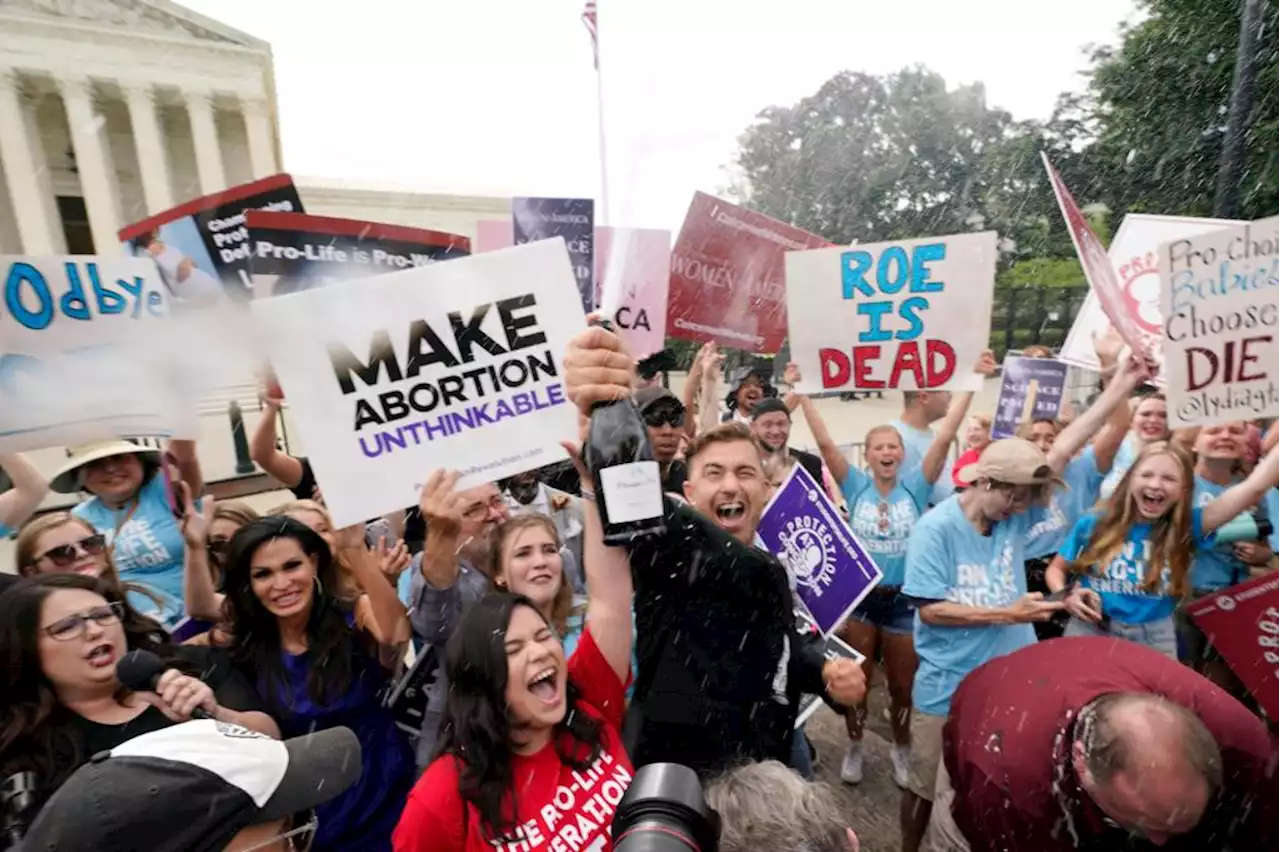Some Republican-led states banned or severely limited abortion immediately, while other restrictions will take effect later. Here is an overview of abortion legislation and the expected impact of the court’s decision in every state.
The U.S. Supreme Court on June 24 overturned Roe v. Wade, the 1973 decision that had provided a constitutional right to abortion. The ruling was expected to lead to abortion bans in roughly half the states, although the timing of those laws taking effect varies.
Background: In 2019, Alabama lawmakers approved what was then the most stringent abortion ban in the country, making it a felony to perform an abortion at any stage of pregnancy with no exceptions for pregnancies resulting from rape or incest. The only exception would be when the woman’s health was at serious risk. A federal judge issued an injunction, under the precedent of Roe v. Wade, blocking the state from enforcing the law.
Effect of Supreme Court ruling: The decision has not immediately affected abortion rights in Alaska, given the existing precedent in the state. What’s next: Brnovich has said he will ask a court to lift the injunction blocking his office and one county from enforcing the pre-statehood total abortion ban. Abortion-rights supporters in Arizona failed to collect enough signatures by the July 7 deadline to ask voters to enshrine the right to abortion in the state constitution this November. Their last-minute effort was a longshot because they needed to collect nearly 360,000 valid signatures in just over seven weeks.
Background: California outlawed abortion in 1850, except when the life of the mother was in danger. The law changed in 1967 to include abortions in the case of rape, incest or if a woman’s mental health were in danger. In 1969, the California Supreme Court declared the state’s original abortion law to be unconstitutional but left the 1967 law in place. In 1972, California voters added a “right to privacy” to the state constitution.
Effect of Supreme Court ruling: The decision didn’t have any immediate impact on Colorado law — but providers are preparing for a surge of out-of-state patients. Democratic House Majority Leader Daneya Esgar says lawmakers must consider how to invest in a health care workforce to ensure Colorado has the capacity to meet that anticipated demand. Colorado’s health department reports there were 11,580 abortions in the state in 2021; of those, 14% were for non-residents.
What’s next: Connecticut’s new law protecting abortion providers from other states’ bans took effect on July 1. It created a legal cause of action for providers and others sued in another state, enabling them to recover certain legal costs. It also limits the governor’s discretion to extradite someone accused of performing an abortion, as well as participation by Connecticut courts and agencies in those lawsuits.
Background: Abortion is legal in the District of Columbia at all stages of pregnancy, a status that was upheld in the 1971 Supreme Court case United States v. Vuitch. However, Congress has oversight power over D.C. laws and Congress has already banned the city from using local funds to pay for abortions for women on Medicaid.
Effect of Supreme Court ruling: The decision places Florida’s 15-week ban on firm legal ground, at least under federal law. However, the legislation is being challenged in state court on arguments that it violates a guarantee of the right to privacy under the state constitution. What’s next: Some Republican lawmakers and candidates want Georgia to go further and ban abortion entirely, but Kemp is unlikely to call a special session before this November’s general election. Lawmakers are likely to consider further action when they return for their annual session in January. The General Assembly or courts will have to sort out whether the provisions designating a fetus as a person are workable.
Background: Following the U.S. Supreme Court’s Roe v. Wade ruling, Idaho passed a law generally allowing abortions in the first and second trimester up to viability at about 23 to 24 weeks. The law allows abortions after viability only to protect the mother’s life or in cases of nonviable fetuses. This year, lawmakers passed a Texas-style ban prohibiting abortions after about six weeks of pregnancy and authorizing family members to sue medical providers for performing an abortion.
Effect of Supreme Court ruling: It did not change access to abortion in Illinois. The Illinois Abortion Act of 1975 legalized abortion but enacted a “trigger law” that would reinstate the ban if Roe were overturned. That trigger law was repealed in 2017 in legislation that also required Medicaid and state employees’ group health insurance to cover abortions.
What’s next: Republican legislative leaders said they expected lawmakers to act on tightening Indiana’s abortion laws during a special legislative session starting July 25 but have given no details about what restrictions would be considered.Political control: Iowa’s Legislature is controlled by Republicans who want to ban or restrict abortion access and a Republican governor who agrees and is up for reelection this year.
Background: Under current law, Kansas does not ban most abortions until the 22nd week of pregnancy, when they’re allowed only to save a patient’s life or to prevent “a substantial and irreversible physical impairment of a major bodily function.” The state Supreme Court in 2019 declared that access to abortion is a “fundamental” right under the state constitution, granting stronger protections to abortion rights than the U.S. Constitution does currently.
Effect of Supreme Court ruling: Abortion services in Kentucky immediately became illegal under a “trigger law” enacted in 2019, but were then allowed to resume by a judge on June 30. The measure contains a narrow exception allowing abortion to prevent the death or permanent injury of a pregnant woman. Kentuckians will be able to vote this November on a proposed amendment declaring there is no right to an abortion in the state constitution.
Edwards signed another bill that would require the doctor to certify that a drug used for abortion was being prescribed for another medical reason. The bill makes it illegal to deliver abortion medication to a state resident “by mail-order, courier, or as a result of a sale made via the internet.” What’s next: Any major changes are unlikely unless former Gov. Paul LePage, a Republican, unseats Mills and Republicans take control of both chambers of the Legislature in November. LePage, a Catholic who opposes abortion rights, has said it’s up to lawmakers to address the abortion issue as they see fit.
What’s next: There is little chance Massachusetts will restrict abortion rights. Baker signed an executive order June 24 barring state agencies from assisting another state’s investigation into people or businesses for receiving or delivering reproductive health services that are legal in Massachusetts. The state also won’t cooperate with extradition requests from states pursuing criminal charges against such individuals.
Background: Abortion has generally been regarded as legal in Minnesota up to the point of fetal viability, around the 24th week of pregnancy, although some legal scholars question whether any cutoff could be legally enforced, citing a decades-old federal court ruling.
Effect of Supreme Court ruling: Mississippi’s only abortion clinic, Jackson Women’s Health Organization, stopped doing abortions on July 6 and said about two weeks later that it would not reopen in Mississippi because it was relocating to New Mexico. Also in July, the clinic ended its legal challenge of a law that bans most abortions once Roe v. Wade is overturned. A judge rejected the clinic’s request to block the law from taking effect.
What’s next: Some Missouri residents wanting abortions are likely to travel to neighboring states, including Illinois and Kansas. A new Illinois logistics center near St. Louis helps women from out of state find travel, lodging and childcare if they need help getting to the area for an abortion, and it connects them with funding sources. The Kansas Supreme Court in 2019 declared that access to abortion is a “fundamental” right under the state constitution.
Background: Nebraska allows most abortions until the 22nd week of pregnancy, although a few small towns have voted to outlaw the procedure within their borders. The state requires doctors to be physically present when patients take the first of two drugs that are used in medication abortions. Lawmakers have rejected attempts to allow abortion medications to be administered remotely, which would provide easier abortion access in rural areas.
Effect of Supreme Court ruling: “Here in Nevada, overturning Roe would not be felt immediately,” state Attorney General Aaron Ford said in a position paper released after the draft U.S. Supreme Court opinion became public. Ford noted that a federal ban on abortion would supersede state law and said it would be naive not to recognize that some people want to ban abortions or make them more difficult to obtain.
What’s next: The majority leader of the New Hampshire House has said the public should not expect Republicans in the Legislature to further tighten state abortion laws. But anti-abortion lawmakers who have filed bills in the past are expected to try again. Democrats are urging Sununu to call a special session of the Legislature to codify abortion rights into state law, but both he and Republican legislative leaders say there is no need.
Background: In 2021, state lawmakers repealed a dormant 1969 statute that outlawed most abortion procedures as felonies, thus ensuring access to abortion even after the federal court rolled back guarantees. Albuquerque is home to one of only a few independent clinics in the country that perform abortions in the third trimester without conditions.
Effect of Supreme Court ruling: Roe v. Wade protections are enshrined in state law. New York is planning to give abortion providers $35 million this year to expand services and boost security in anticipation of an influx of out-of-state people seeking abortions once any ruling comes down. It’s unclear how many more people from neighboring states could travel to New York to receive abortion care.
What’s next: Republican General Assembly leaders didn’t consider additional abortion restrictions in their legislative session that ended July 1. The party will likely intensify its efforts in this year’s elections to gain the five additional seats it needs for veto-proof margins. Cooper and other Democrats already are making abortion rights a key campaign issue. Abortion politics also are expected to figure into two state Supreme Court elections in November.
United States Latest News, United States Headlines
Similar News:You can also read news stories similar to this one that we have collected from other news sources.
 N.J. congresswoman arrested during abortion protest outside U.S. Supreme CourtRep. Bonnie Watson Coleman marched with some House colleagues outside the U.S. Supreme Court.
N.J. congresswoman arrested during abortion protest outside U.S. Supreme CourtRep. Bonnie Watson Coleman marched with some House colleagues outside the U.S. Supreme Court.
Read more »
 Two Bay Area congresswoman arrested at abortion rights protest outside U.S. Supreme CourtBay Area Congresswomen Barbara Lee and Jackie Speier were among 35 people who were arrested during an abortion rights protest outside the U.S. Supreme Court. 'One has a moral responsibility to push back against unjust laws,' Lee said.
Two Bay Area congresswoman arrested at abortion rights protest outside U.S. Supreme CourtBay Area Congresswomen Barbara Lee and Jackie Speier were among 35 people who were arrested during an abortion rights protest outside the U.S. Supreme Court. 'One has a moral responsibility to push back against unjust laws,' Lee said.
Read more »
 Macy’s will open Toys R Us shops inside all U.S. stores, including State Street flagshipSince last August, Macy’s has sold Toys R Us products exclusively online.
Macy’s will open Toys R Us shops inside all U.S. stores, including State Street flagshipSince last August, Macy’s has sold Toys R Us products exclusively online.
Read more »
 U.S. Drivers Have Lost $8 Billion to Red Lights — Can AI Traffic Signals Save Us?The Department of Energy says idling for more than ten seconds burns more fuel and produces more CO-2 than shutting off and restarting your engine. A 2021 traffic signal report says drivers in Nevada spend more time idling at red lights than drivers in any other state. Nationwide, Americans spend 6.8 percent of each trip at red lights, accounting for…
U.S. Drivers Have Lost $8 Billion to Red Lights — Can AI Traffic Signals Save Us?The Department of Energy says idling for more than ten seconds burns more fuel and produces more CO-2 than shutting off and restarting your engine. A 2021 traffic signal report says drivers in Nevada spend more time idling at red lights than drivers in any other state. Nationwide, Americans spend 6.8 percent of each trip at red lights, accounting for…
Read more »
 Allies seek to follow U.S. lead on Xinjiang forced labor ban -U.S. officialU.S. allies appear committed to following Washington's lead banning forced labor goods from China's Xinjiang region, a senior U.S. official told Reuters on Monday, warning companies they could not maintain 'deliberate ignorance' about their supply chains.
Allies seek to follow U.S. lead on Xinjiang forced labor ban -U.S. officialU.S. allies appear committed to following Washington's lead banning forced labor goods from China's Xinjiang region, a senior U.S. official told Reuters on Monday, warning companies they could not maintain 'deliberate ignorance' about their supply chains.
Read more »
 Macy’s to Bring Toys ‘R’ Us to All Its U.S. Stores, Starting This MonthIn an expansion of its partnership with WHP Global, Macy’s will bring the Toys “R” Us brand to all its stores in the U.S.
Macy’s to Bring Toys ‘R’ Us to All Its U.S. Stores, Starting This MonthIn an expansion of its partnership with WHP Global, Macy’s will bring the Toys “R” Us brand to all its stores in the U.S.
Read more »
